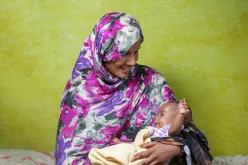Sudan’s armed conflicts, natural disasters, epidemics and persistent economic underdevelopment pose a unique and challenging context for its children. Today, more than 2.3 million children need humanitarian assistance, 3.1 million children are out of school and 550,000 children are severely acutely malnourished and at risk of death.
Tasuku Matsumura, a HRD UN Volunteer from Japan arrived to commence his assignment with the United Nations Children's Fund (UNICEF) in Khartoum as the protracted humanitarian crisis in Sudan became compounded by new emergencies.
An influx of South Sudanese refugees, suspected cases of Acute Watery Diarrhoea and high malnutrition rates in newly accessible areas placed new demands on already stretched humanitarian agencies and further imperilled the survival, growth and development of the country’s children.
As the leading UN Agency for the protection and advocacy of children, UNICEF’s equity approach works to ensure that all children have an opportunity to survive, develop and reach their full potential without discrimination, bias or favouritism.
The equity-based approach in UNICEF’s programmes and policies seeks to understand and address the root causes of inequity so that all children, particularly those who suffer the worst deprivations in society, have access to education, health care, sanitation, clean water, protection and other services necessary for their survival, growth and development.
Good knowledge management can play a critical part in the ability of agencies like UNICEF to enhance response capacities and gain better visibility over
In a complex and restrictive operating environment, Tasuku commenced his assignment as a Humanitarian Policy Officer and was tasked with assisting the UNICEF Country Representative and Emergency/Field Operations Chief in humanitarian and development policy work, reporting and knowledge management.
The ability to accurately collect and reliably store humanitarian knowledge is a vital and necessary element of UNICEF’s effectiveness.
I recognized early the importance of effective knowledge management to humanitarian operations. During my assignment, I made significant progress in improving the flow of information and communication in the office, by establishing new knowledge management methodologies and processes for capturing and recording information. --Tasuku Matsumura, UN Volunteer Humanitarian Policy Officer
Embodying UNICEF’s equity approach, one of Tasuku’s key responsibilities was to coordinate the delivery of an integrated AWD response plan. An outbreak of Acute Watery Diarrhoea that started in April 2017 resulted in more than 36,000 cases and an average of 30 deaths across Sudan’s 18 states per week. Tasuku’s response plan helped UNICEF in Sudan contain the 2017 AWD outbreak and will prevent spread of further outbreaks in future.
Tasuku set about enhancing UNICEF’s emergency preparedness capacity by implementing an online Emergency Preparedness Platform (EPP). Tasuku coordinated with Head Quarters, the Regional Office and Sections to organise training workshops, collect information and develop Emergency Preparedness scenarios. Tasuku’s implementation of the EPP was the first pilot in the MENA region and will serve as a successful model for future rollouts.
The added value of a UN Volunteer is to contribute to lifesaving and sustainable development activities through the thoughts of volunteerism. --Tasuku Matsumura
Since joining UNICEF, Tasuku has remained in Sudan and continues his work, moving from the Khartoum office to the field.
UNICEF is the custodian or co-custodian of 17 SDG indicators. Tasuku’s assignment contributed to the achievement of several of them.
This article was prepared with the kind support of Online Volunteer Helen Maccan.

